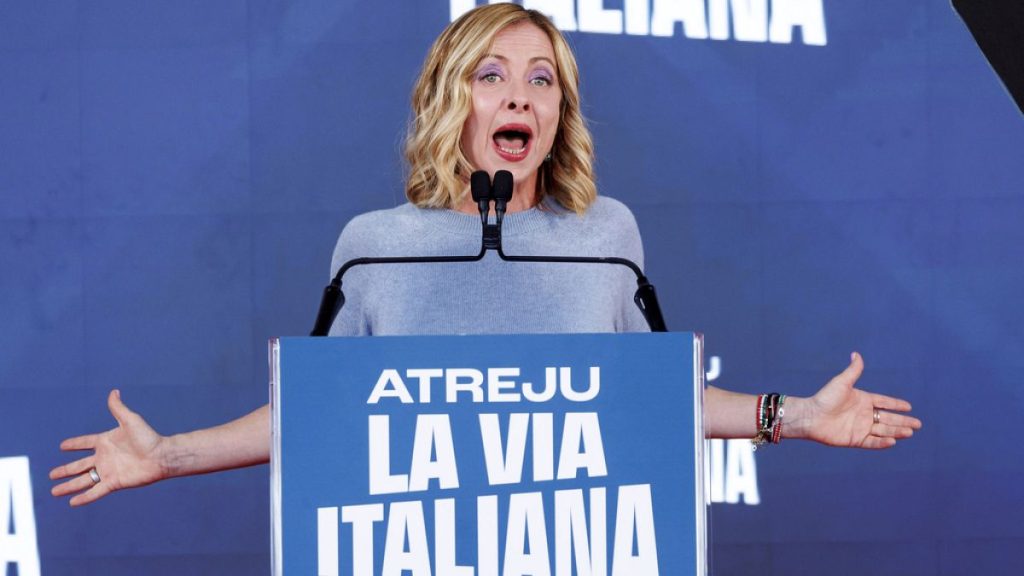Giorgia Meloni’s Resignation from ECR Presidency and Focus on Italian Stability
Italian Prime Minister Giorgia Meloni announced her resignation as president of the European Conservatives and Reformists (ECR) Group during her Brothers of Italy party’s annual youth festival in Rome. This decision marks a significant shift in Meloni’s political priorities, as she emphasizes her commitment to ensuring political stability within Italy. Meloni’s government, two years into its term, has demonstrated remarkable stability, a stark contrast to Italy’s historically turbulent political landscape. This stability, Meloni argues, is crucial for bolstering Italy’s credibility both domestically and on the international stage. Her confidence in the government’s longevity, expressing her belief that it will complete its full term, underscores this focus on enduring stability. The resignation from the ECR presidency allows Meloni to dedicate more energy and attention to domestic affairs, further solidifying her commitment to Italy’s continued political and economic progress.
Meloni’s decision to support Poland’s Prime Minister Mateusz Morawiecki as the next ECR leader demonstrates a strategic move within the European political landscape. By endorsing Morawiecki, Meloni maintains influence within the ECR while freeing herself from the day-to-day responsibilities of the presidency. This allows her to focus on her domestic agenda while still contributing to the broader conservative movement within Europe. Morawiecki, as the leader of Poland’s Law and Justice party, shares many ideological similarities with Meloni, suggesting a continued alignment between the two countries within the ECR framework. This transition of leadership within the ECR signifies a potential strengthening of ties between Italy and Poland, potentially leading to greater collaboration on shared conservative priorities within the European Union.
The Brothers of Italy youth festival, attended by over 300 guests including representatives from both Italian opposition parties and international figures like Lebanese Prime Minister Najib Mikati, served as a platform to showcase Meloni’s government’s achievements and future direction. The presence of opposition members suggests a degree of cross-party acknowledgement of the government’s stability, perhaps indicating a more collaborative political environment within Italy. Mikati’s attendance highlighted the importance of international relations, particularly in areas where Italy plays a significant role, such as the UNIFIL peacekeeping mission in Lebanon. The festival transformed into a celebration of Meloni’s leadership and the government’s stability, reinforcing the message of a strong and united Italy under her guidance.
Najib Mikati’s presence at the festival underscores Italy’s critical role in maintaining regional stability, especially in the context of the UNIFIL mission in Southern Lebanon. Mikati emphasized the importance of Italy’s continued support for the peacekeeping force, which plays a vital role in upholding the ceasefire agreement between Lebanon and Israel. The maintenance of this ceasefire is crucial for preventing further conflict and promoting long-term stability in a region prone to volatility. Mikati’s remarks highlight the international recognition of Italy’s contributions to peace and security, reinforcing Italy’s position as a key player in regional diplomacy and conflict resolution.
Beyond the immediate concerns of Lebanon, Mikati also addressed the broader regional challenges posed by the ongoing Syrian crisis. He highlighted the critical role the European Union must play in facilitating the safe and voluntary return of Syrian refugees to their homeland. The Syrian refugee crisis has placed a significant burden on neighboring countries and Europe as a whole. Mikati’s call for EU action emphasizes the need for a coordinated international effort to address the humanitarian consequences of the conflict and create conditions conducive for refugee repatriation. The discussion of the Syrian crisis underscores the interconnectedness of regional stability, highlighting the need for comprehensive solutions that address the root causes of conflict and displacement.
In summary, Giorgia Meloni’s resignation as ECR president, coupled with her emphasis on Italian political stability, marks a strategic refocusing of her political priorities. By prioritizing domestic affairs, Meloni aims to solidify her government’s position and ensure its longevity. Her endorsement of Morawiecki for the ECR leadership reinforces her commitment to the conservative movement within Europe while allowing her to concentrate on Italian interests. The presence of international figures like Najib Mikati at the Brothers of Italy youth festival underscored the importance of international collaborations and Italy’s role in addressing regional challenges, particularly in the Middle East. The discussions on Lebanon and Syria highlight the complexities of maintaining regional stability and the need for international cooperation in addressing humanitarian crises and promoting peaceful resolutions to conflicts. Meloni’s actions and pronouncements signal a clear commitment to strengthening Italy’s domestic stability and its position on the world stage.

